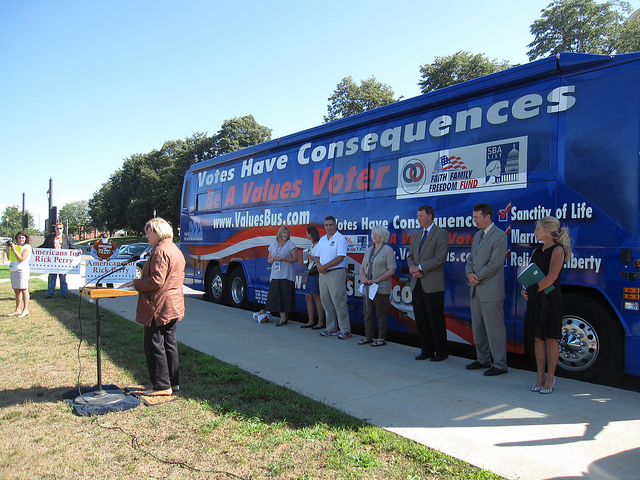Are voters rational?
 https://www.flickr.com/photos/iowapolitics/
https://www.flickr.com/photos/iowapolitics/
Are voters rational? There is, unfortunately, no easy answer to the question. Social psychological science, like all science, is a quest for knowledge in a complicated world. However, research helps us advance closer to a genuine understanding of voter rationality – or irrationality, as the case may be. As a part of a three-part series on the subject of voter rationality, my colleagues Matt Motyl, Mark Brandt, and I will discuss some theories and research dealing with voters’ attitudes and behaviors. We hope you will stay a part of the conversation with us!
Voter rationality has long been a topic of great interest among academics (for example, work by Anthony Downs, 1957), journalists (work by Thomas Frank, 2004), and ordinary people. Who has not heard or uttered phrases like why are voters so irrational? What does it mean, though, for voters to be rational? The Webster’s New World Dictionary defines rational as “derived from reasoning,” “not foolish or silly,” “sound thought or judgment, good sense,” and “to think coherently and logically.” Do these definitions apply to voters, then?
Arthur Lupia, Mathew McCubbins, and Samuel Popkin (2000) argue that these are not ideal working definitions of rationality for the purpose of studying political behavior. Who decides what is foolish, or good sense? Let us work, then, from a popular (though hardly universal) concept of rationality, especially in economics and political science: “…people are rational in that they have an objective and pursue it in a reasonably consistent fashion…the objective being pursued is utility maximization; that is, people are assumed to strive toward the goal of making themselves as happy as they can…” (Ehrenberg & Smith, 1997). Happiness (“utility maximization”) is supported by material well-being, and so “rational” political behavior involves maximizing one’s wealth, income, living conditions, access to and quality of food, health care, educational opportunities, and so on. Rational, self-interested “utility” can be achieved through voting for candidates / policies that create a welfare system that benefits oneself, through voting for economic policies of trade that benefit citizens and thus oneself, and so on.
Do voters maximize their material well-being through the candidates and policies they vote for? There is quite a bit of disagreement regarding the answer to this question, and I will discuss a few (of many) examples of conflicting views. Thomas Frank (2004), approaching the topic as a journalist, reported on “middle” Americans’ tendencies to vote against their material well-being in favor of voting based on their moral beliefs. However, Larry Bartels (2006) – using United States nationally representative survey data with responses from many individuals, as is common among political scientists – analyzed the voting behavior of specifically “working class” White Americans and found that they vote based on economic considerations more than moral ones. Relatedly, it is well established by political scientists and analysts that African Americans (who, on average in the United States, have lower material well-being than White Americans) show tremendous allegiance to the Democratic Party – an American party that runs, in part, on a platform of redistribution of wealth.
What can social psychology in particular tell us about voter rationality? Indeed, some social psychologists aiming to understand political behavior have also done so through the lens of self-interest as a potential source of political preferences. Yet, even the findings within this
field are inconsistent. For example, some research by Jim Sidanius and Felicia Pratto (1999) suggests that people often endorse social policies that favor themselves. However, other research by James Kluegel and Eliot Smith (1986) suggests poor people often oppose redistribution.
In one theoretical perspective, some psychologists have focused on the role that beliefs play in leading people to “irrationally” support a system that disadvantages them. For instance, John Jost and his colleagues Brett Pelham, Oliver Sheldon, and Bilian Sullivan (2003) found that lower status people (such as ethnic minorities, people with less income, and so on) were more likely to see their social systems as legitimate than were higher status people. They showed that some lower status people were more likely than higher status people to support limitations on rights to criticize the government, to trust government officials, and to believe that economic inequality is legitimate and necessary to foster effort.
Why might this be? These psychologists theorized that lower status people may see a “system” that disadvantages them as legitimate because they may need to explain to themselves why they are failing to fight said system. Failing to fight the system is irrational if pursuing material well-being is what is rational. By experiencing the “cognitive dissonance” that arises when two beliefs conflict (and idea originating with Leon Festinger and James Carlsmith, 1959), lower status people need to resolve this psychological conflict. Essentially, it feels unreasonable that a system is unfair and yet one is doing nothing about it. Thus, such persons may convince themselves that the system must not really be so bad after all.
However, other evidence suggests such occurrences may be the exception rather than the rule. For instance, Mark Brandt (2013) found that, when comparing a number of lower and higher status groups around the world (such a racial minorities vs. majorities, women vs. men, etc.), it was rare for lower status people to perceive social, economic, and political features of their systems as more legitimate than higher status people perceived them. In fact, some evidence suggested the opposite, with higher status people being the ones to perceive their systems as more legitimate. For example, people with more education and/or income trusted the government and societal institutions more.
Complicating the question of voter rationality even further, material self-interest is not the only way to think about rationality. It may also be understood in terms of successfully connecting one’s policy preferences with one’s vote, regardless of whether addressing material well-being, same- sex marriage, or any number of other issues. Importantly, people – including voters – can reason through information in a biased manner so that they arrive at the conclusions they want (a process described by Ziva Kunda, 1990). If one has been a lifelong Republican and this affiliation has become an important part of one’s identity, changes in the Republican Party’s agenda may be ignored when continuing to vote for Republican candidates. Thus, a voter may be irrational in that she or he does not use information toward coming to those most accurate conclusions that would enable matching policy preferences with vote choices. Of course, this is assuming a given voter even has political information to use effectively.
Certainly, further research is essential to better understanding voter rationality, and the following writers in this series will tell you about more research relevant to this topic. Look out for our follow-up discussions of voter rationality, coming soon!
References:
Bartels, L. M. (2006). What’s the matter with What’s the Matter with Kansas? Quarterly Journal of Political Science, 1, 201–226.
Brandt, M. J. (2013). Do the disadvantaged legitimize the social system? A large-scale test of the status–legitimacy hypothesis. Journal of Personality and Social Psychology, 104, 765-785.
Downs, A. (1957). An economic theory of democracy. New York: Harper and Row.
Ehrenberg, R. G., & Smith, R. S. (1997). Modern labor economics: Theory and public policy, 6th ed. (p. 4). Reading, MA: Addison-Wesley.
Festinger, L., & Carlsmith, J. M. (1959). Cognitive consequences of forced compliance. Journal of Abnormal and Social Psychology, 58, 203–210.
Frank, T. (2004). What’s the matter with Kansas? How conservatives won the heart of America. New York: Henry Holt & Company.
Jost, J. T., Pelham, B. W., Sheldon, O., & Sullivan, B. N. (2003). Social inequality and the reduction of ideological dissonance on behalf of the system: Evidence of enhanced system justification among the disadvantaged. European Journal of Social Psychology, 33, 13–36.
Kluegel, J. R., & Smith, E. R. (1986). Beliefs without inequality: Americans’ view of what is and what ought to be.Hawthorne, NJ: Aldine de Gruyter.
Kunda, Z. (1990). The case for motivated reasoning. Psychological Bulletin, 108, 480-498.
Lupia, A., McCubbins, M. D., & Popkin, S. L. (2000). Beyond rationality: Reason and the study of politics. In A. Lupia, M. D. McCubbins, & S. L. Popkin (Eds.), Elements of reason: Cognition, choice, and the bounds of rationality (pp. 1-20). Cambridge & New York: Cambridge University Press.
Sidanius, J., & Pratto, F. (1999). Social dominance: An intergroup theory of social hierarchy and oppression. NewYork: Cambridge University Press.
article author(s)
article keywords
blog categories
- Culture (13)
- Current Events (9)
- Gender (6)
- Meaning Making (7)
- Other (3)
- Political Psychology (11)
- Race & Ethnicity (7)
- Solid Science (8)

